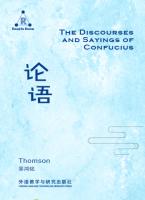Book Review
The first Chinese scholar to translate Chinese classics into foreign languages, Ku Hungming made use of western philosophical language and concepts to interpret Confucianism which is quite peculiar in the history of classical translation.
The translation practice of Ku Hungming has been a controversial topic. Traditional source-text-oriented translation cannot satisfactorily explain it. However, modern translation theory of target-text-oriented approach tends to observe translation from a more tolerant perspective and it inspires translation theorists with a new insight into the translation studies; that is to say, linguistic equivalence is no longer the overriding concern. These cultural conceptions lay a theoretical and methodological. foundation for our re-evaluation of Ku Hungming and his translations. It can fully explain why Ku's domesticated version is so successful and why it exerted such an enormous impact on the western society. Moreover, the application of these cultural conceptions to the study of Ku Hungming may enrich our understanding of Ku Hungming and his translations and may be conducive to a re-assessment of his accomplishment and contributions as a literary translator.
Under the paradigm of skopos theory, the translator's intended purpose of translation determines the whole translation process. Exposed in a critical moment of Chinese history, Ku Hungming had many purposes of translation in mind such as to eliminate the misunderstandings of western people, uplift the image of China and Chinese people and spread Chinese culture and civilization, to name just a few. Being a scholar and patriot who had a clear idea of both Chinese and western learning, Ku was well aware what kind of translation would be more effective and what kind of translation could be more impressive and more accessible to the western readers. Therefore, in order to attain his translation purposes, Ku Hungming adopted domestication method to translate Lunyu, making his version special. Ku's distinctive personal style of translation of Lunyu received a wide popularity among the English readers.
Moreover, based on the reflections on Lefevere's conception of rewriting, the writer attempted to observe Ku's translation from an objective and descriptive perspective. Lefevere's rewriting theory provides a convincing argument for Ku's cultural orientation of translation and for a better understanding of Ku Hungming's patriotism. Driven by his particular ideological considerations, the translator may choose certain texts for translation, and apply certain strategies or styles to translation;and he may rewrite the text deliberately to manipulate the translation. This paper analyzed Ku's ideological considerations and how his ideological orientations exerted influences on his translation. Each step of the translation process-from the selection of Lunyu to be translated to the employment of translation strategies is manipulated by Ku's ideologies. Orienting towards the western culture and readers, Ku Hungming aimed to provide the Chinese readers with an understandable and expressive version. Manipulated by his special ideologies, Ku chose to translate the representative work of Chinese civilization. Through a descriptive analysis of Ku's remarks of Chinese culture and Ku's translation of Lunyu, the author concludes that the shifts in the translation, such as omission of the Ku's disciples' names and additions of famous figures' remarks are not "errors" but a kind of rewriting manipulated by Ku's ideological motivation.
Ku adopted the method of domestication to manipulate the original and produced a special version which appealed to the target readers. In terms of the influence of Ku Hungming's translation, Ku has attained his intended purposes and his translation was justified and was really successful.



 京公网安备 11010802032529号
京公网安备 11010802032529号